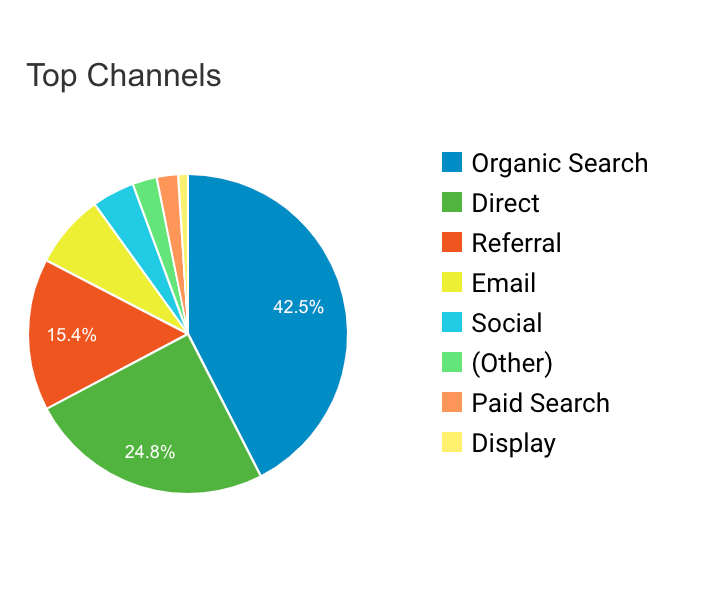What Is SEO?
SEO, or search engine optimization, is the process of making content streamlined to achieve better results on searched topics. For example, the Office of Undergraduate Admissions should be a topic result on Google for the search term “University of Illinois Admissions.” When someone types in that search term, our website should be one of the first results.
The largest web traffic source category for the Admissions website is search. For many of us, search traffic makes up much of the traffic we get on our websites each day. Many of us like to imagine that users come into our website via the homepage, pick out a content area from the main navigation, and then filter down into the information or resources they came to find. That simply isn’t true.

A pie chart of user source data from traffic on the Illinois Admissions website in 2021.
When looking for information and resources, the web journey for many users is to type what they are looking for into Google and go from there. Making sure our pages are as close to the top of those search results as possible is critical.
How SEO Works
SEO is a complicated and fast-changing subject. First of all, you might want to optimize for multiple search engines. Google matters the most, but YouTube videos should also be optimized for YouTube SEO. Second, search engines change their algorithms (and what those algorithms look for or weigh more heavily) all of the time.
We should be able to count on a few things as marketers. You can find great SEO guides online that can get into way more detail (there is so much to know about SEO!), but here are a few general tips:
- Titles and headers matter. In general, search engines prioritize pages that effectively indicate they are about the search term.
- URLs matter. Your page address should align as much as possible with your title and chosen search term.
- Use the search term multiple times. You don’t want to spam, but you should present the search term multiple times throughout your content.
- Page authority. This one is complicated, but having other sites link to your page (and site in general) increases your page’s perception of credibility in the eyes of search engines, increasing your likelihood of appearing as a search result.
What to Prioritize With SEO
- Find search terms to optimize for. You can use a range of free and paid SEO tools (like Google Trends) to see what search terms have traffic already. No need to guess what people are searching. Plus, changing a few words can have a big impact. Be sure to choose search terms that your unit is the best choice to own. We don’t want our search term choices to negatively affect others on campus.
- Make a list of terms that make sense for your unit. Keep in mind that there might be more common terms (likely “short tail” instead of “long tail” keywords) and less common ones that would make sense for your unit to use. Some might be unit specific and others more broad.
- Identify content you can create or revise to be optimized for a search term. For instance, the department of Aerospace Engineering might want to have a page that is optimized for “aerospace at Illinois.” To create SEO content for this term, the department might adapt a page about information for the major that already exists.
- Optimize future content. When making choices on future content development needs, make sure people are searching for a term that points to it, and optimize the content as it is made.